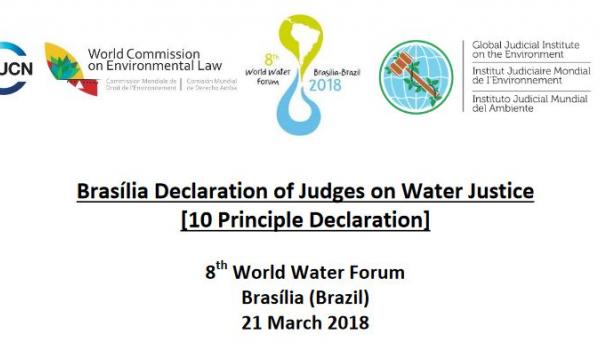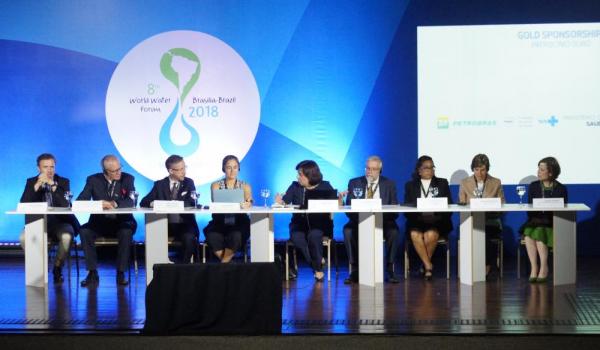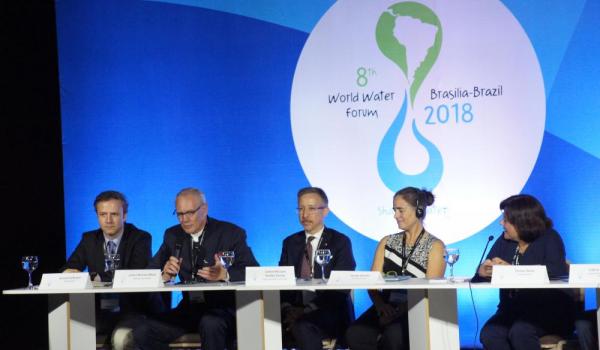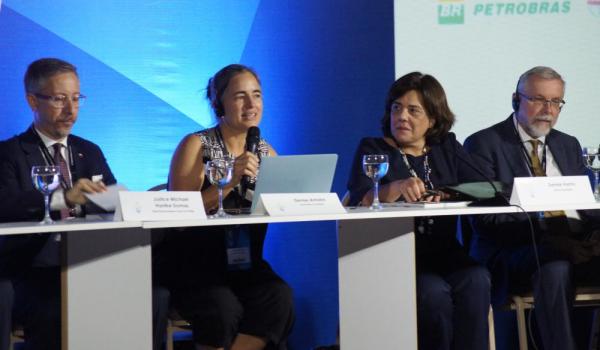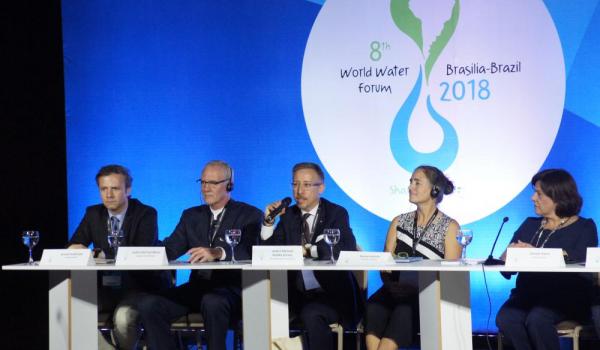The Brasília Declaration of Judges on Water Justice provides a set of ten principles for guiding the legal community worldwide for the protection of freshwater and freshwater ecosystems. The Declaration is a milestone conveying the crucial role of judges at the forefront of freshwater governance, and thus the mitigation of environmental damage, biodiversity loss, and climate change. WCEL looks forward to promoting the Declaration as an essential tool to guide and increase dialogue that advances substantial work at national, regional, and international levels for freshwater protection.
Brasília Declaration of Judges on Water Justice
The Brasília Declaration of Judges on Water Justice was approved on 21 March 2018 by the Conference of Judges and Prosecutors on Water Justice during the 8th World Water Forum in Brazil.
Background
The Brasília Declaration was a main outcome of the Conference of Judges and Prosecutors on Water Justice that brought together over 140 distinguished participants from more than 60 countries to engage in high-level discussions on the management, use, and protection of freshwater resources. Principles outlined in the Declaration are the result of rigorous discussion and expert contributions made during a five-month process that began with consultations among an Expert Scientific Drafting Committee. Consultations expanded to videoconference discussions with leading representatives of the Global Judicial Institute on the Environment (GJIE). Upon arriving in Brazil, in-person drafting sessions and roundtable discussions provided further input and final amendments.
Ten principles of the Brasília Declaration of Judges on Water Justice
- Principle 1 – Water as a Public Interest Good
- Principle 2 – Water Justice, Land Use, and the Ecological Function of Property
- Principle 3 – Water Justice and Indigenous and Tribal Peoples and Mountain and Other Peoples in Watersheds
- Principle 4 – Water Justice and Prevention
- Principle 5 – Water Justice and Precaution
- Principle 6 – In Dubio Pro Aqua
- Principle 7 – Polluter Pays, User Pays and Internalisation of External Environmental Costs
- Principle 8 – Water Justice and Good Water Governance
- Principle 9 – Water Justice and Environmental Integration
- Principle 10 – Procedural Water Justice
Approval of the Declaration
Presenting the Declaration in plenary on 21 March, Denise Hamu (UN Environment Representative to Brazil) recognized the fundamental role of water in society and the public demand for judiciaries around the world to be involved in resolving issues related to water resources. She added that the Forum’s inclusion of judges and prosecutors is an important step forward in understanding the role of the law in the conservation of freshwater, and the Brasília Declaration of Judges on Water Justice will now be fundamental in coalescing dialogue and action. Co-chair Denise Antolini (Professor of Law and Associate Dean for Academic Affairs, William S. Richardson School of Law, University of Hawai’i, and Deputy Chair, IUCN World Commission on Environmental Law) praised the incredible work of the Expert Scientific Drafting Committee and the inclusive process buoyed by good will and a deep sense of the importance of such a Declaration to the world. It was added that the Brasília Declaration breaks through a glass ceiling by reflecting consensus across all continents and activating the Global Judicial Institute on the Environment to give judges a voice by providing tools that can be activated across the environmental law community.
Additional speakers reinforcing support for the Declaration, included:
- Claudia de Windt (Senior Legal Specialist and Chief Environmental Law, Policy and Good Governance, Department of Sustainable Development, Organization of American States – OAS) delighted at the expansive process and careful consideration of every point leading to the Declaration. She added that the value of the ten principles is not only their general applicability, but also specificity to assist individual judges facing such issues in their courts.
- Justice Ragnhild Noer (Supreme Court of Norway and Member, Interim Governing Committee, Global Judicial Institute on the Environment) emphasized that we need nature, as nature doesn’t need us. Therefore, the ten principles put the legal implications of this statement into practice by inspiring work and reiterating the importance of independent courts.
- Justice Michelle Weekes (High Court of Barbados and Member, Interim Governing Committee, Global Judicial Institute on the Environment) endorsed the rigorous consultation process and the incredibly exciting experience of reaching approval of the Declaration. She commended the approach of providing general principles that can be applied to current and future challenges and encouraged the judges in the audience to use the declaration as guidance when upholding the importance of water justice.
- Justice Brian Preston (Chief Judge, Land and Environment Court of New South Wales and Member, Interim Governing Committee, Global Judicial Institute on the Environment) signaled the Declaration as a seminal step in taking ideas that have not been enforced and moving them toward the reality of principles to be implemented in the reality of practice.
- Justice Michael Hantke Domas (Chief Justice, Third Environment Court of Chile) concurred that approval of the Declaration meant that all judges now have a tool to make informed and fair decisions about the interrelationship of ecosystems and human society.
- Justice Michael Wilson (Supreme Court of Hawai’i and Member, Interim Governing Committee, Global Judicial Institute on the Environment) noted that the principles of the Declaration are everyone’s principles to promote equity and sharing freshwater and ecosystems for the benefit of future generations. Moreover, the principles are courageous in taking a stance to stand together and recognize that the enduring human spirit and beauty of nature are intertwined.
- Arnold Kreilhuber (Deputy Director, Environmental Law Unit, UN Environment) reiterated that the Declaration and its principles already have real life applications and impacts, and implementation going forward can lead to a more fair and just society that distributes environmental burdens and benefits equally.
- Justice Antonio Herman Benjamin (National High Court of Brazil – STJ; Chair, IUCN World Commission on Environmental Law; and Member, Interim Governing Committee, Global Judicial Institute on the Environment) highlighted inclusion of the principles In Dubio Pro Aqua, the ecological function of property, and water as a public interest good as cementing water as the foundation of life. He congratulated everyone for their contributions to such a meaningful outcome of the Conference and for the planet, and officially announced approval of the Brasília Declaration of Judges on Water Justice.
The Declaration was approved in its original Engish-language version. Unofficial Spanish-language and French-language translations are now available. Contributions of subsequent translations into other languages are greatly appreciated.
